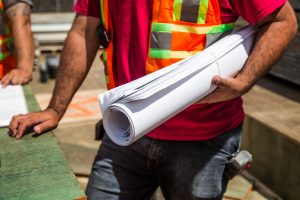On March 18, 2020, Governor Andrew Cuomo issued Executive Order 202.6 reducing the in-person workforce of any non-essential businesses in the State of New York. That Order deemed construction to be an essential function.

However, in an effort to further flatten the curve, on March 30, 2020, Governor Cuomo issued Executive Order 202.13, modifying the projections relating to construction that were contained in Executive Order 202.6. Executive Order 202.13 states:
Executive Order 202.6 is hereby modified to clarify that construction which was an essential service not subject to the in-person work restrictions is modified to provide only certain construction is considered exempt from the in-person restrictions as of March 28, 2020. Further, on and after March 27, 2020, Empire State Development Corporation is hereby authorized to determine which construction projects shall be essential and thereby exempt from the in-person workforce prohibition, contained in EO 202.6 and subsequent Executive Orders which further reduced the workforce requirements. All continuing construction projects shall utilize best practices to avoid transmission of COVID-19.
This Order rolls back the blanket waiver that was given to all construction projects, making non-essential projects subject to the in-person restrictions as of March 28, 2020. As has been done with other industries, Governor Cuomo granted authority to the Empire State Development Corporation (“ESDC”) to determine which projects are essential, and therefore exempt from the workforce reduction requirements.
All construction projects that continues in New York is required to utilize best practices to avoid the transmission of COVID-19 among workers. Failure to do so is subject to a fine of up to $10,000 per violation.
ESDC has issued guidance determining what projects may stay open. It has determined that all non-essential construction must be shut down until further notice. Only non-essential projects with a single worker on the job site may continue. Essential construction includes roads, bridges, transit facilities, utilities, hospitals or health care facilities, affordable housing, and homeless shelters.
ESDC’s guidance specifically states:
- Construction
- All non-essential construction must shut down except emergency construction, (e.g. a project necessary to protect health and safety of the occupants, or to continue a project if it would be unsafe to allow to remain undone until it is safe to shut the site).
- Essential construction may continue and includes roads, bridges, transit facilities, utilities, hospitals or health care facilities, affordable housing, and homeless shelters. At every site, if essential or emergency non-essential construction, this includes maintaining social distance, including for purposes of elevators/meals/entry and exit. Sites that cannot maintain distance and safety best practices must close and enforcement will be provided by the state in coordination with the city/local governments. This will include fines of up to $10,000 per violation.
- For purposes of this section construction work does not include a single worker, who is the sole employee/worker on a job site.
If you believe that your construction project is essential, but it does not specifically fall within the listed categories of essential projects, you MUST seek an exemption from ESDC in order to continue working. Failure to do so can result in fines by the New York Attorney General, who is investing reports of businesses that fail to comply with the closure orders.
An exemption may be requested from ESDC on its website at:
https://esd.ny.gov/content/request-designation-essential-business-purposes-executive-order-2026
For more information, the ESDC guidance on essential businesses may be found here: https://esd.ny.gov/guidance-executive-order-2026
For frequently asked questions about essential businesses:
https://esd.ny.gov/sites/default/files/ESD_EssentialEmployerFAQ_032220.pdf
If you require any assistance navigating the essential business guidelines for construction projects, or determining your rights under you contract in light of the coronavirus, whether or not it is subject to closure, please email Elizabeth A. Genung at [email protected] for further information.
For more information contact attorney Elizabeth A. Genung.


